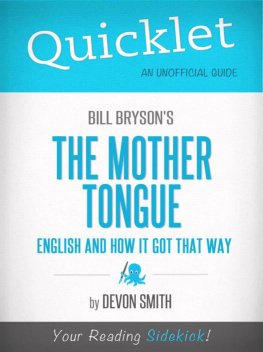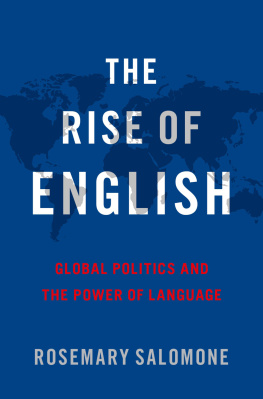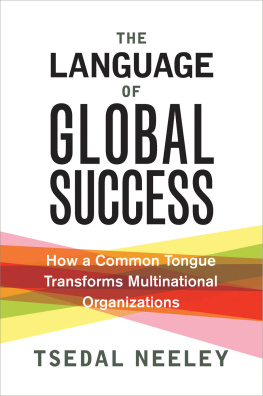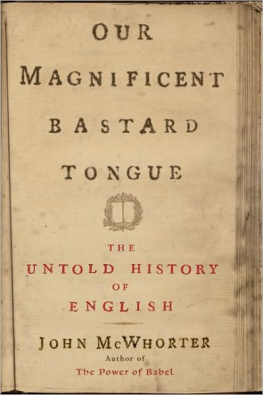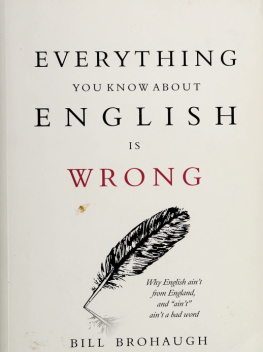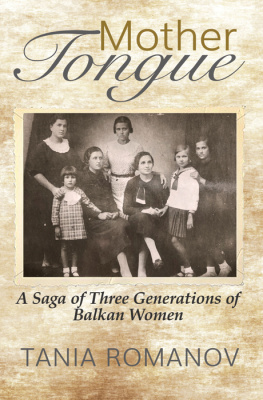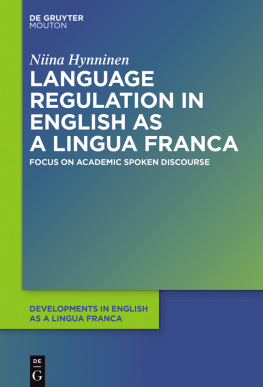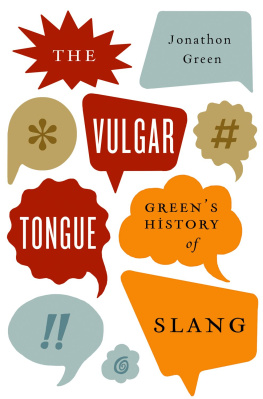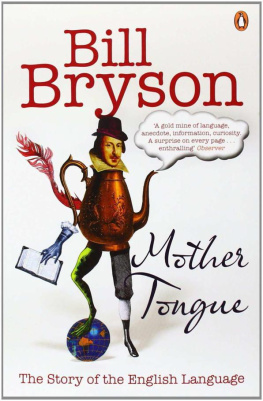Quicklet On Bill Bryson's The Mother Tongue - English And How It Got That Way
About Mother Tongue: English and How It Got That Way
In Mother Tongue: English and How It Got That Way , Bill Bryson guides us through the complicated history of the English language to figure out why it is the way it is. Its an interesting journey, part thesis and part pop science, that explains the most significant events in the development of the English language with lots of useful tidbits along the way.
English started gaining dominance as a global language during the 20th century with the rise of American supremacy. Mother Tongue was published in 1991, in the midst of the fall of Communism when America became the undisputed victor of the Cold War and, some would say, of the world. Since that time, English has surpassed all other languages as the global lingua franca , not only in the business and commerce sector, but in science, technology, diplomacy, and tourism as well.
More and more people are learning English these days, and no one questions its importance on the global stage, but the question that inevitably keeps popping up is this: WHY? Why has English become so universal? Why does English so easy for many speakers of other languages to learn? Why is it so hard for others? Why do we speak the way we do? Why dont all native speakers sound the same? Why do many non-native speakers understand each other better than native speakers?
Bill Bryson set out to answer those questions and hundreds more in Mother Tongue . Although now known primarily as a best-selling travel writer, Bryson had only recently left the world of journalism at the time he wrote Mother Tongue . He investigates the history, structure, and status of the English language with the tenacity of a newspaperman writing a special interest piece, digging up facts and tidbits and humorous examples in an engaging, decidedly nonacademic way.
Mother Tongue was not Brysons first language book, nor was it his last. The book was so well-received and the subject so interesting to him that in 1996 he followed it up with Made in America: An Informal History of the English Language in the United States . Although now over 20 years old and marred by some unfortunate inaccuracies, Mother Tongue is still an excellent introduction to the world of linguistics and English for the casual reader.
About Bill Bryson
According to The New Statesman , Bill Bryson was born in 1951 in Des Moines, Iowa , in the heart of the U.S. Both of his parents worked at the local newspaper, and his older brother did so as well. So it was a family business, he says in an interview with ABC Australia . You worked in the newspapers in my house. And so it never occurred to me to do anything else other than go into newspapers.
Although born into a literary household, The New York Times says that Bryson ended up dropping out of college . The BBC says that he first backpacked to England in 1973 , where he met his wife. He began to work as a newspaper editor in London in 1977 , according to The New Statesman .
At that time, he didnt write for a living. In the ABC Australia interview , he says, It wasnt until I got married and started having kids and needed to supplement my income that I began writing articles as a way of getting a little extra money.
In 1989, Bryson published his first major book , The Lost Continent: Travels in Small-Town America , says The New Statesman . The BBC says that in 1995 he moved his wife and children to America so they could experience that country first-hand, but in 2003 they moved back to England, where they still live. ( Smitten by Durham )
Some of his other books are A Short History of Nearly Everything (2003) and A Walk in the Woods: Rediscovering American on the Appalachian Trail (1998).
In addition to being an international best-selling writer, Bill Bryson campaigns on behalf of humanitarian organizations and actively pursues the preservation and restoration of rural England and the British countryside, as reported by Durham University, where Bryson served as Chancellor for six years. ( Bill Bryson )
Overall Summary
In the first three chapters of Mother Tongue , Bryson introduces many of the questions that he will address in the rest of the book. These chapters contain a discussion of English in the world (The Worlds Language), an overview of the evolution of language in humans and the history of linguistics (The Dawn of Language), and an introduction to linguistic theory and terminology with explanations of many of types of linguistic features among modern languages (The Global Language).
In Chapter 4, The First Thousand Years, Bryson starts delving deepermuch deeperinto English itself. This chapter is about the history of language on the British Isles. The Celtics, Anglo-Saxons, Vikings, and Normans all passed through these lands, and while English is Germanic in origin, today it is a complete mishmash of Romance and Germanic vocabulary and grammar because of these varied influences.
Bryson then talks about the rapid evolution of English through the times of Chaucer, during which the language was greatly simplified, and Shakespeare, who was perhaps the single most innovative wordsmith in the history of the language.
The next six chapters are devoted to the nitty-gritty of English mechanics. First Bryson talks about the various processes by which new words and new meanings come into a language (Where Words Come From).
He also talks about English pronunciation and why it is often so unpredictable and troublesome (Pronunciation). One of the major historical linguistic events that influenced English pronunciation was the Great Vowel Shift, where our vowels slowly began changing into other vowels, in the process breaking whatever relationship there was between spelling and pronunciation.
Next comes a chapter on dialects, or the pronunciation, vocabulary, and grammatical variations across different English-speaking regions, occupations, and ethnicities of the world (Varieties of English).
One particular maddening discussion is the one about English spelling and orthography, or writing (Spelling). One of the major ideas here is that when English adopts words from foreign languages (which it does frequently), it often preserves the original spelling, which may or may not obey the spelling rules of native English words.
An interesting chapter on English grammar follows (Good English and Bad). In this chapter, Bryson explains that there are two types of grammars: prescriptive, which is the one with strict rules that we study in school, and descriptive, which is the study of language as it is really spoken, regardless of the so-called rules.
Finally, Bryson ends this section with a chapter on vocabulary, specifically how and why the English language has such a large vocabulary (Order Out of Chaos). This chapter also tells the history of etymology, or the study of a words history, and the first lexicographers, or dictionary writers.
The next two chapters discuss English as a sociological phenomenon. Old World, New World talks about the evolution of American English from its British English roots, which was influenced by as many political factors as environmental factors. English as World Language follows the spread of the language even further, past the boundaries of the U.S. and into the rest of the world.
Bryson devotes three chapters to one-off subjects of linguistic interest: names, swearing (a particularly colorful chapter), and wordplay. In his last chapter, Bryson muses on the future of English, bringing up the politically charged issues that the spread of English has opened up, and the growing division between American English and British English.

